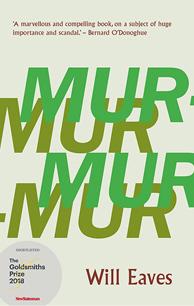Murmur
 Taking its cue from the arrest and legally enforced chemical castration of the mathematician Alan Turing, Murmur is the account of a man who responds to intolerable physical and mental stress with love, honour and a rigorous, unsentimental curiosity about the ways in which we perceive ourselves and the world. Formally audacious, daring in its intellectual inquiry and unwaveringly humane, Will Eaves’s new novel is a rare achievement.
Taking its cue from the arrest and legally enforced chemical castration of the mathematician Alan Turing, Murmur is the account of a man who responds to intolerable physical and mental stress with love, honour and a rigorous, unsentimental curiosity about the ways in which we perceive ourselves and the world. Formally audacious, daring in its intellectual inquiry and unwaveringly humane, Will Eaves’s new novel is a rare achievement.
About the author
Will Eaves is the author of four novels and two collections of poetry. He was Arts Editor of the Times Literary Supplement from 1995 to 2011 and now teaches at the University of Warwick. The opening section of Murmur was shortlisted for the 2017 BBC National Short Story Award.
The judges on the shortlist
Deborah Levy on Murmur
Murmur is a novel of multiple ideas, which seems right given its main protagonist, Alec Pryor, is loosely based on the predicament of the philosophical mathematician, Alan Turing. It is also a novel forged from an immensely beautiful writing intelligence. Murmur is a fully achieved literary experiment, digging deep into all the dimensions of human consciousness, including state sanctioned savagery.
If its organising themes range from artificial intelligence, desire, sexuality, the limits of human understanding, the risks involved in love, it is also an investigation into the codes of language itself. At time, Eaves shamanistically thinks himself into the dreams of his gentle protagonist, a man who is in great distress. Chemical castration is the punishment for his sexuality. Its effect on the mind and body of the human subject is in poignant conversation with the societal mind that inflicts this kind of primal punishment.
Back to the shortlist